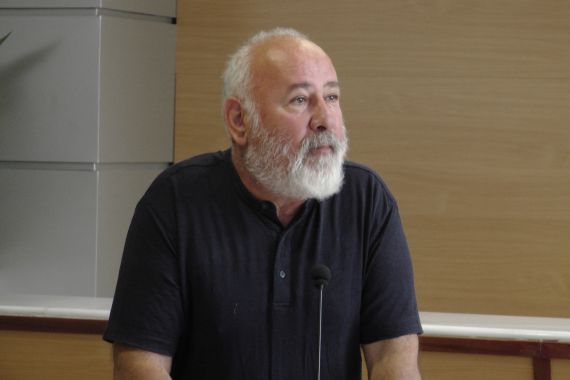Anti-austerity
in the referendum, euro-currency and austerity in the national
elections
by system
failure
The
big question after September's snap elections in Greece, is, why
Greeks voted for parties who agreed to pass the 3rd memorandum? A
memorandum which brings new catastrophic measures imposed by Greece's
creditors when Tsipras surrendered to the Brussels-Berlin axis.
 It
becomes harder to explain the paradox, considering that in the
referendum a few months
earlier, the Greeks clearly voted against the imposed austerity,
despite the war of propaganda and the closed banks. Moreover, just
before the snap elections, they knew what to expect from Tsipras, as
he had already surrendered and agreed to sign the catastrophic
memorandum.
It
becomes harder to explain the paradox, considering that in the
referendum a few months
earlier, the Greeks clearly voted against the imposed austerity,
despite the war of propaganda and the closed banks. Moreover, just
before the snap elections, they knew what to expect from Tsipras, as
he had already surrendered and agreed to sign the catastrophic
memorandum.
The
most obvious answer, is that voters had limited options. Popular Unity, the party that came out of SYRIZA's split,
expressing its most radical side, had no sufficient time to prepare
and persuade the Greek public opinion that indeed has a viable plan
for Grexit. Costas Lapavitsas,
who joined Popular Unity, was one of the most committed to the
possibility of a national currency for Greece. It seems that he was
fighting almost by himself on this matter, trying to present a
reliable plan.
What's
most important and barely mentioned in the Greek media (mainstream
and internet), is that the unprecedented percentage of people who
didn't vote in the elections, came not only from the big
disappointment of Greeks. It came also from the fact that a
significant percentage of SYRIZA's voters in previous elections, were
people who deliberately refrained from any electoral process in the
past and attracted by SYRIZA's radical elements.
When
Tsipras defeated, taking back all his promises, this part of the
electorate lost again, easily its trust to SYRIZA, Popular Unity and
the political system as a whole.
People lost their trust to the mainstream media too, something which became very
clear in the week before the referendum. While the mainstream media
propaganda did everything to make people vote for the new
catastrophic measures, the result was clearly against these measures.
People said 'NO' to the catastrophic austerity.
However,
the propaganda seemed to be effective to a certain degree, concerning
specific people. From a point and after, the media concentrated not
to SYRIZA as a whole, but to the 'systemic threats' like Panagiotis
Lafazanis, Zoe Konstantopoulou,
Yanis Varoufakis and Costas Lapavitsas. Many of them joined Popular
Unity later.
Generally,
the media tried to "decompose" these people to the voters,
as being totally unreliable, or, even having specific "behavioural"
problems in some cases. All the "parades" of these people
to the mainstream media had only such a purpose. It is something that
the US media are doing right now, more or less, with Bernie Sanders,
probably through a more sophisticated way.
The
case of Zoe Konstantopoulou is characteristic. From the first moment
as Speaker of the Hellenic Parliament, she took very important
initiatives, concerning the investigation of big scandals under
previous (PASOK – New Democracy) governments, as well as, the audit
of public debt through the Debt Truth Committee. However, the corrupted media of the local
oligarchs tried to manufacture ridiculous stories against her, in
order to distract the Greek public from these important initiatives.
The
most impressive in the whole story, is that the media suddenly
re-discovered Vassilis Leventis,
the leader of the Union of Centrists party. Leventis was brought to
surface by the media already since the previous elections. Many of
them interviewed him and tried to "fix" his image, as being
a reliable "new" political force. However, during previous
years, especially during 90s, the media were nearly making fun of him
due to his particular character and way of expression.
This
time Leventis passed "all the tests". Generally, in his
interviews, he blamed the corrupted public sector and the previous
political system for the situation in Greece, but avoided to condemn
the corrupted banking system and its enormous responsibilities. He
also appeared as a fanatic supporter of euro, fiercely attacking
anyone who would dare to suggest that Greece should exit the eurozone
to be saved. That was enough: he was "labeled" by the system as a
serious and experienced politician this time, in contrast of the "crazy"
radicals of Popular Unity, who proposed Grexit as a serious option.
And guess what: he managed to get elected with nine seats in the new
parliament, while Popular Unity didn't manage to get elected at all!
Of
course, the main reason for which Popular Unity didn't manage to get
elected, was because for five years the banking-media dictatorship
brainwashed middle class with a propaganda of terror in case of
Grexit. But the most impressive, is that the absolute catastrophe for
Greece came within the eurozone and continues unabated!


























0 σχόλια:
Δημοσίευση σχολίου